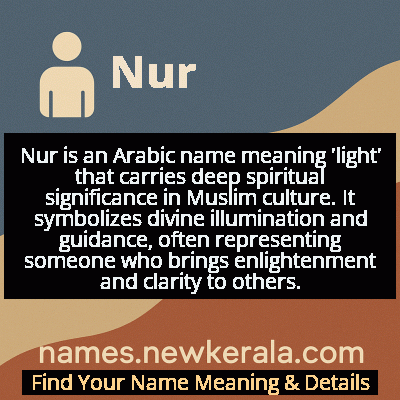Nur Name Meaning & Details
Origin, Popularity, Numerology Analysis & Name Meaning of Nur
Discover the origin, meaning, and cultural significance of the name NUR. Delve into its historical roots and explore the lasting impact it has had on communities and traditions.
Name
Nur
Gender
Male
Origin
Muslim
Lucky Number
8
Meaning of the Name - Nur
Nur is an Arabic name meaning 'light' that carries deep spiritual significance in Muslim culture. It symbolizes divine illumination and guidance, often representing someone who brings enlightenment and clarity to others.
Nur - Complete Numerology Analysis
Your Numerology Number
Based on Pythagorean Numerology System
Ruling Planet
Saturn
Positive Nature
Ambitious, efficient, realistic, and authoritative.
Negative Traits
Materialistic, stressed, confrontational, and can be overly ambitious.
Lucky Colours
Dark blue, black.
Lucky Days
Saturday.
Lucky Stones
Blue sapphire, amethyst.
Harmony Numbers
2, 4, 6.
Best Suited Professions
Business leaders, managers, financial services, law enforcement.
What People Like About You
Leadership, determination, organizational skills.
Famous People Named Nur
Nur Muhammad Taraki
Political Leader
First President of Afghanistan and founder of the People's Democratic Party
Nur ad-Din Zangi
Military Leader
Powerful ruler who united Muslim forces against Crusaders and established the Zengid dynasty
Nur Jahan
Empress
Powerful Mughal empress who effectively co-ruled the empire with her husband Jahangir
Name Variations & International Equivalents
Click on blue names to explore their detailed meanings. Gray names with will be available soon.
Cultural & Historical Significance
In many Muslim societies, naming a child Nur is seen as invoking divine blessings and hoping the child will grow to be a source of guidance and enlightenment to others. The name has been borne by numerous historical figures who played significant roles in Islamic civilization, from military leaders who defended Muslim lands to scholars who preserved and advanced Islamic knowledge. This historical legacy continues to influence the name's popularity and cultural resonance across generations.
Extended Personality Analysis
Individuals named Nur are often perceived as intelligent, spiritually inclined, and possessing natural leadership qualities. They tend to be thoughtful, analytical, and drawn to seeking deeper meanings in life. Their name's association with light often translates into personality traits such as being illuminating in conversations, providing clarity in complex situations, and serving as beacons of guidance for others. Many Nurs exhibit strong moral compasses and are often respected for their wisdom and integrity.
These individuals typically possess a calm demeanor but can be fiercely determined when pursuing their goals. The spiritual connotation of the name often manifests in people who are reflective, compassionate, and dedicated to making positive contributions to their communities. They tend to be natural problem-solvers who bring light to dark situations and hope to challenging circumstances. Their presence often has a calming effect on others, and they're frequently sought out for advice and guidance due to their perceived wisdom and balanced perspective.
Modern Usage & Popularity
In contemporary times, Nur remains a popular name throughout the Muslim world, particularly in Arabic-speaking countries, Turkey, South Asia, and Southeast Asia. While traditionally more common as a male name, it has gained popularity as a unisex name in some regions. The name maintains strong religious significance while also appealing to modern parents for its simplicity and profound meaning. In Western countries with Muslim populations, Nur has become increasingly common as families seek names that preserve cultural and religious identity while being easily pronounceable in multicultural settings. The name's popularity has remained relatively stable over decades, reflecting its timeless appeal and deep cultural roots, though it has seen some variation in spelling adaptations to suit different linguistic contexts.
Symbolic & Spiritual Meanings
The name Nur symbolizes divine illumination, spiritual enlightenment, and guidance. It represents the light that dispels darkness, both literally and metaphorically, serving as a beacon of hope, knowledge, and truth. In Islamic mysticism, Nur represents the primordial light from which all creation emanates and the inner light that guides believers toward righteousness. The name carries connotations of purity, clarity, and divine blessing, suggesting someone who brings illumination to complex situations and serves as a moral compass. It symbolizes the intersection between the divine and human realms, representing how spiritual light manifests in human character through wisdom, compassion, and ethical conduct, making it one of the most spiritually significant names in Islamic tradition.

